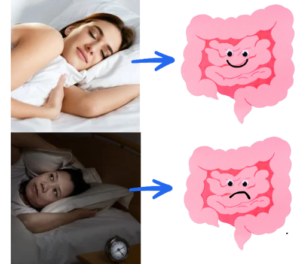Understanding the Critical Connection Between Quality Sleep and Digestive Health
Sleep serves more than just a restorative function; it is a fundamental biological process that profoundly impacts our digestion. The intricate relationship between sleep and digestive health encompasses various physiological mechanisms that work synergistically. The body's circadian rhythm, or internal biological clock, coordinates both sleep cycles and digestive functions, explaining why individuals typically experience hunger at regular intervals throughout the day. This synchronization underscores our bodies' remarkable ability to align with natural biological cycles, emphasizing the importance of both sleep and proper digestion for overall health.
Understanding Why Quality Sleep is Vital for Peak Digestive Performance 
Sleep is essential for the body’s ability to heal, rejuvenate, and restore optimal function. The deeper stages of sleep are particularly crucial for these restorative processes. During these profound phases, the organs, tissues, and cellular structures that constitute the digestive system enter a state of relaxation and engage in vital repair mechanisms. The body prioritizes cellular repair and growth during these deep sleep stages, especially regarding the regeneration of cells that line the digestive tract. These cells endure constant wear and tear from exposure to food particles and digestive enzymes, making their regeneration vital for maintaining the integrity of the gastrointestinal lining. This process, in turn, enhances the efficiency and effectiveness of digestion.
Deep sleep also plays a significant role in strengthening the immune system, which is particularly crucial for the digestive system. This system contains its own specialized immune cells, which are activated by the beneficial bacteria residing in the gut. These immune cells are essential for defending the gut and the overall digestive system against harmful pathogens, thereby ensuring a balanced and healthy population of bacteria in the gut environment.
Moreover, the organs within the digestive system are integral to the body's detoxification processes, assisting in the removal of waste and harmful substances. Deep sleep significantly enhances this detoxification process by boosting the operational efficiency of the liver and kidneys, enabling these vital organs to function optimally. The synergistic relationship between sleep and detoxification plays a critical role in promoting overall digestive health and wellness.
Investigating the Relationship Between Gut Motility and Sleep Patterns
An essential aspect of digestion is the effective movement of food and waste through the digestive tract, a process known as gut motility. This process undergoes significant changes during sleep. Throughout both deep and light stages of sleep, the rate of gut motility experiences a marked reduction. This decrease is a necessary adjustment that allows the digestive system to conserve energy, which is redirected towards repairing digestive tissues. This conservation of energy enables the digestive processes to operate more efficiently when awake, enhancing both nutrient absorption and waste elimination.
The migrating motor complex represents a series of contractions that occur during fasting periods, including during sleep. This cycle is vital for maintaining gut motility, as it effectively sweeps away food particles and debris that may remain in the digestive system. This natural cleansing mechanism of the digestive tract minimizes the risk of bacterial overgrowth, promoting a balanced and healthy gut environment. Notably, the migrating motor complex is most actively engaged at night, when individuals are fasting and asleep, illustrating the essential role of sleep in protecting the health of the digestive system.
As dawn approaches, gut motility gradually increases, preparing the digestive system to efficiently process and digest food. This rise in motility can also trigger the first bowel movement of the day, exemplifying the finely tuned relationship between sleep and gut motility. Recognizing and understanding this connection is vital for optimizing digestive health and enhancing overall well-being.
Exploring the Impact of Hormones on Sleep and Digestive Health
Ghrelin, commonly known as the hunger hormone, is a key hormone that stimulates appetite. In contrast, leptin signals to the brain that the stomach is full, aiding in the prevention of overeating. Together, these hormones are crucial for appetite regulation; however, their functions can be negatively impacted by insufficient sleep.
Even a single night of inadequate sleep can lead to elevated levels of ghrelin, which may increase appetite and often result in cravings for carbohydrate-rich foods. This phenomenon is commonly described as feeling ‘hangry’. Compounding this issue, leptin levels can drop following a night of insufficient sleep, disrupting the signals that indicate satiety. This creates a challenging scenario where individuals may overeat and make unhealthy food choices while struggling to recognize their body’s cues to stop eating. While occasional poor sleep may not lead to severe consequences, chronic insomnia can result in significant digestive issues, including gut inflammation, liver disorders, gastroesophageal reflux disease, inflammatory bowel disease, and even colorectal cancer, alongside contributing to weight gain.
Understanding the Digestive Health Implications of Sleep Disruption
Disruptions to sleep can lead to a variety of significant digestive issues. Factors such as shift work, particularly night shifts, and the experience of jet lag can severely disrupt sleep patterns and disturb the body’s internal clock. Moreover, consuming late-night meals or having irregular eating schedules can negatively influence the quality of sleep. The circadian rhythm, which regulates sleep, is closely tied to exposure to natural sunlight, which is essential for maintaining a healthy sleep-wake cycle.
Unfortunately, in our modern, technology-driven world, many people spend a significant portion of their daytime indoors, leading to decreased exposure to natural light. This change has resulted in increased exposure to blue light emitted by electronic devices, such as laptops, televisions, and smartphones, which further disrupts the sleep cycle and sleep patterns, particularly when this exposure occurs in the hours leading up to bedtime.
The cumulative effects of these factors can result in serious digestive issues, including diarrhea, ulcers, inflammatory bowel disease, or the disruption of the delicate balance between beneficial and pathogenic bacteria in the gut. This imbalance can also damage the gut lining, complicating matters concerning digestive health.
Promoting a Healthy Microbiome Through Quality Sleep
The microbiome refers to the vast array of trillions of microorganisms residing in the gut, predominantly composed of beneficial bacteria known as probiotics, alongside viruses, fungi, and potentially harmful bacteria. These microbes play a crucial role not only in overall health but also in digestive health. They enhance the immune response and assist in digestion, facilitating the production of essential vitamins, enzymes, hormones, and amino acids. Recent studies have highlighted a strong association between the microbiome and sleep, indicating that disrupted sleep or chronic insomnia can negatively affect the balance of these microbes, ultimately impacting digestive health and overall wellness.
Delving into the Complex Interactions Between Microbiome Health and Sleep Quality
The intricate connection between sleep and microbiome health is multifaceted. Poor sleep can negatively impact microbiome health, while an imbalanced microbiome can also detrimentally affect sleep quality. To better understand this complex relationship, one study revealed a correlation between the abundance of specific bacterial types in the gut and faster sleep onset, as well as fewer nighttime awakenings. Although this article cannot cover all findings, the essential takeaway is that cultivating a diverse and abundant population of beneficial bacteria in the gut is vital for achieving quality sleep, effective digestion, and maintaining overall health.
Analyzing the Interrelationship Between Stress, Sleep, and Digestive Well-being
A frequent outcome of stress and anxiety is disrupted sleep. Conversely, these psychological challenges can also adversely affect the physical health and functionality of the digestive system. This disruption can lead to altered gut motility and contribute to issues such as indigestion, ulcers, and irritable bowel syndrome. A critical factor in this dynamic is the influence of the stress hormone, cortisol.
The Role of Cortisol in Digestive Processes
When cortisol levels rise, the body enters a fight-or-flight state. This physiological response leads to blood flow being redirected to essential organs such as the heart, brain, lungs, and muscles, while blood flow to the digestive system is diminished. This response prepares the individual to confront threats or flee, a reaction that was crucial for survival in earlier times.
In modern life, however, stressors are often less life-threatening, such as financial pressures, workplace challenges, or inadequate sleep. While short-term blood flow redirection may be beneficial in urgent situations, chronic stress can have detrimental effects on the digestive system, particularly concerning gut motility. This can lead to symptoms including constipation, diarrhea, indigestion, gas, and bloating. Consequently, implementing effective stress management techniques is vital for supporting gut health and attaining quality sleep.
Ensuring adequate sleep is crucial for maintaining a healthy digestive system, as the link between sleep and digestion is fundamentally intertwined. Focusing on effective sleep hygiene practices is essential for achieving restorative sleep. Recommended practices include minimizing exposure to blue light from electronic devices, maintaining a consistent sleep schedule, creating a cool and dark sleep environment, avoiding food intake within two hours of bedtime, and ensuring exposure to natural light during the day, especially in the morning.
References
Understanding Digestive Health and Circadian Rhythms
Exploring Sleep Dysfunction and Digestive Conditions
Examining the Link Between the Gut Microbiome and Sleep
Investigating Stress and Its Effects on the Digestive System
The Article: How Sleep Affects Your Digestive System appeared first on https://janestevensnutrition.com
The Article: Sleep’s Impact on Your Digestive System Explained appeared first on https://janestevens.net
The Article Sleep’s Impact on Digestive Health Explained Was Found On https://limitsofstrategy.com



Comments are closed